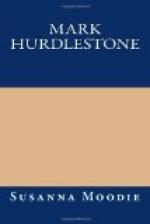“Let him alone, Lucy; the lad cannot help it; ’tis born in him. The Hurdlestones are a money-making, money-loving race. Besides, what does it matter? If he is saving a fortune at our expense, ’tis all in the family. He knows how to take care of it better than we do. There will be more for Algernon, you know!”
And this saying quieted the fond mother. “Yes,” she repeated, “there will be more for Algernon,—my handsome generous Algernon. Let his sordid brother go on saving,—there will be more for Algernon.”
These words, injudiciously spoken within the hearing of Mark Hurdlestone, converted the small share of brotherly love, which hitherto had existed between the brothers, into bitter hatred; and he secretly settled in his own mind the distribution of his father’s property.
And Algernon, the gay thoughtless favorite of his kind but imprudent mother, was perfectly indifferent to the love or hatred of his elder brother. He did not himself regard him with affection, and he expected nothing from him, beyond the passive acquiescence in his welfare which the ties of consanguinity generally give. If he did not seek in his twin brother a friend and bosom-counsellor, he never imagined it possible that he could act the part of an enemy. Possessing less talent than Mark, he was generous, frank, and confiding. He loved society, in which he was formed by nature to shine and become a general favorite. His passion for amusement led him into extravagance and dissipation; and it was apparent to all who knew him, best that he was more likely to spend a fortune than acquire one.
Algernon had received, with his brother, a good classical education from his uncle, a younger brother of his father’s, who had been brought up for the Church, and taken several degrees at Oxford, but had reduced himself to comparative indigence by his imprudence and extravagance. Alfred Hurdlestone would have made a good soldier, but, unfortunately for him, there were several valuable church-livings in the family; and his father refused to provide for him in any other way. The young man’s habits and inclinations being at war with the sacred profession chosen for him, he declined entering upon holy orders, which so enraged his father, that he forbade him the house; and at his death, left him a small life-annuity, sufficient with economy to keep him from starvation, but not enough to maintain him respectably without some profession.
For several years, Alfred Hurdlestone depended upon the generosity of a rich maternal uncle, who gave him the run of the house, and who left him at his death a good legacy. This the ne’er-do-well soon ran through, and finding himself in middle life, destitute of funds and friends, he consented for a trifling salary to superintend the education of his brother’s children.




